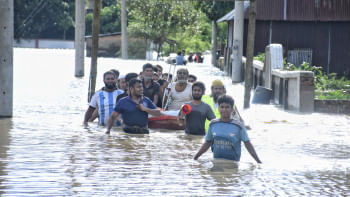Flood-hit farmers need proper support

As floodwaters begin to recede in the Mymensingh, Netrokona and Sherpur region, the scale of the destruction caused by the recent flash floods is gradually becoming apparent. Current estimates suggest that Aman crops over 83,000 hectares of land have been totally or partially ruined, impacting around 322,000 farmers. Moreover, a large number of fish farms have been washed away. In Sherpur alone, floods have washed away the fish from 7,366 ponds, affecting around 4,500 farmers. While a comprehensive assessment of the damage done to agriculture, fish farms, livestock and properties can only be made after the water fully recedes, it is already clear that recovery will be an immense challenge for this agriculturally crucial region.
Farmers whose crops have been destroyed have an uncertain future awaiting them. The damage to this season's Aman paddy is beyond repair, as the window for new cultivation has already passed. How will these farmers survive? Or, consider the case of fish farmers like Mohammad Ali, who had taken the lease of an acre of land to set up a fish farm and invested nearly Tk 7 lakh by taking a bank loan. He and others like him have not only lost their livelihoods but are now saddled with a crushing debt.
While the flood situation in these districts has improved to some extent over the last few days, many villages in low-lying areas still remain inundated. According to the local administration, about 13,000 families are still trapped by water. These people, too, face an uncertain future, not knowing what awaits them when the waters finally recede.
Under the circumstances, the government must urgently come up with a robust post-flood recovery plan for all the affected areas, while continuing its relief efforts by providing food, medicine and other essential supplies to the victims. Understandably, livelihood rehabilitation, particularly for farmers, will be one of the government's biggest challenges as they need to be given an alternative choice of crops or vegetables to cultivate since the Aman season is already over. To this end, the Department of Agricultural Extension should swiftly assess the conditions on the ground and identify suitable crops and vegetables for the affected areas. Immediate distribution of crop saplings, vegetable seeds, fertilisers, and other necessary inputs is also essential.
Those who cannot go back to their previous livelihoods must be given alternative means of earning a living. This is a huge task requiring strong coordination among all the relevant government agencies. We hope that the government will rise to the challenge, supported by NGOs and philanthropic organisations, to meet the post-flood needs of the affected communities.


 For all latest news, follow The Daily Star's Google News channel.
For all latest news, follow The Daily Star's Google News channel. 





Comments